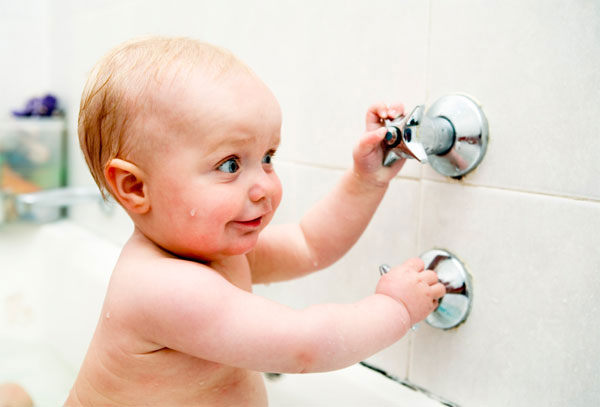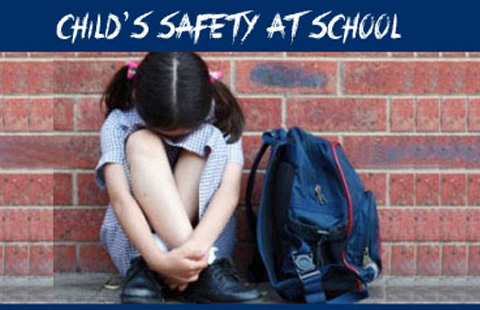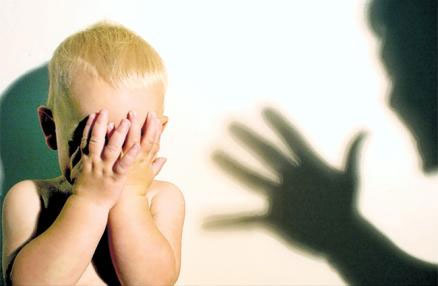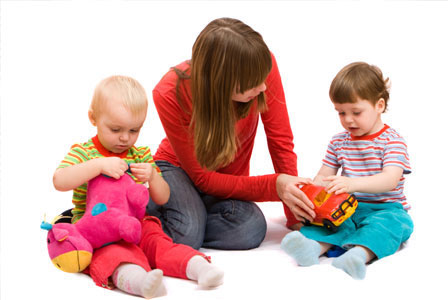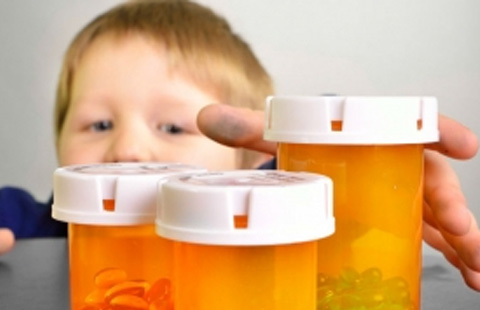Bath time can be fun yet deadly. Read about preventing your child from being injured in a bathroom accident. Statistics show that many injuries to children are caused by household mishaps with bathroom accidents accounting for a large number of these injuries. As a parent, it is your priority to keep your child safe. Here are some ways to keep your child secure while he enjoys his bath. In this articleSupervise your childSecure the bath areaKeep dangerous objects out of reachWatch out for electrical appliancesSupervise your child It is easy for your child to get hurt even if you turn away just for a few moments. Leaving a young child alone while he is having a bath can be dangerous. When you are giving your child a bath, you should be completely focused on the task and your child. Avoid distractions by taking the telephone off the hook before you begin bathing your child. If someone knocks at the door, avoid rushing to answer it. You could put a small note on the door to inform people that you will not be available for the duration of the bath. For example, I am sorry but I will not answer the door for the next half hour could suffice. You may think that this sounds a little extreme. However, remember that a child could be hurt in a span of a few seconds. Secure the bath area It is very easy for small pools of water to remain in a bath tub after someone finishes their bath. Also, a child tends to splash water around the bath area in his excitement. Water on bathroom floors, and in tubs, tend to make the surfaces slippery. You or your child could slip on them, accidentally, and end up with serious injuries. Place an anti-skid bath mat in the tub so your child can stand on it after he finishes his bath and before he leaves the tub. Have a rug placed outside of the bathtub so that your child can step onto it without dripping water all over the floor. This minimises the risk of your child slipping and falling in the tub or on the floor. Keep dangerous objects out of reach Your child is young and will be naturally curious about certain things he sees. Generally, children are fascinated by shiny objects and are drawn to them. Prevent your child from coming in contact with shiny yet sharp implements like razor blades, scissors, tweezers, etc. An injury caused by one of these objects can not only be deep, but also can cause wounds that get infected. Keep these items in a locked cabinet that your child cannot reach easily. Dispose of the used implements in a garbage can that your child does not have access to. Follow the same precautions when it comes to bathroom cleaning supplies and items in your medicine cabinet. Medicines should be kept in containers with child-proof caps to prevent children from accidentally consuming them. Make sure your medicine cabinet is placed at a height where the child cannot access it. Avoid storing cleaning materials like disinfectants, under the sink in your bathroom. Almost all cleaning substances are extremely toxic and could prove fatal if your child were to mistakenly ingest one of them. Either store them in locked cabinets or build a shelf high up so that your child cannot get at them. If neither option is feasible for you, consider storing the cleaning materials in a different part of the house instead of the bathroom. Watch out for electrical appliances Avoid leaving electrical appliances like hair dyers, electric razors, etc. plugged in when they are not in use to prevent your child from handling them. Also, secure exposed plug points with plastic covers that are used when no appliance is plugged in. This will prevent your child from trying to put his fingers into an exposed plug point, and will protect him against electrocution. Always check your water heater and adjust its temperature to make sure that your child does not get scalded by the hot water. Ideally, the water should just be lukewarm. However, if you are unsure of how hot the water actually is, consider buying a thermometer that you can use to check the water temperature. Even after you have taken all possible precautions, remember that accidents can happen at any time. So keep a first aid kit in your medicine cabinet to deal with any injuries. Avoid letting this deter you from making your childs bath time a fun activity.
Bath time can be fun yet deadly. Read about preventing your child from being injured in a bathroom accident. Statistics show that many injuries to children are caused by household mishaps with bathroom
accidents accounting for a large number of these injuries. As a parent, it is your priority to keep your child safe. Here are some ways to keep your child secure while he enjoys his bath.
Supervise your child
It is easy for your
child to get hurt even if you turn away just for a few moments. Leaving a young child alone while he is having a bath can be dangerous. When you are giving your child a bath, you should be completely focused on the task and your child. Avoid distractions by taking the telephone off the hook before you begin bathing your child. If someone knocks at the door, avoid rushing to answer it. You could put a small note on the door to inform people that you will not be available for the duration of the bath. For example, 'I am sorry but I will not answer the door for the next half hour' could suffice. You may think that this sounds a little extreme. However, remember that a child could be hurt in a span of a few seconds.
Secure the bath area
It is very easy for small pools of water to remain in a bath tub after someone finishes their bath. Also, a child tends to splash
water around the bath area in his excitement. Water on bathroom floors, and in tubs, tend to make the surfaces slippery. You or your child could slip on them, accidentally, and end up with serious injuries.
Place an anti-skid bath mat in the tub so your child can stand on it after he finishes his bath and before he leaves the tub. Have a rug placed outside of the bathtub so that your child can step onto it without dripping water all over the floor. This minimises the risk of your child slipping and falling in the tub or on the floor.
Keep dangerous objects out of reach
Your child is young and will be naturally curious about certain things he sees. Generally, children are fascinated by shiny objects and are drawn to them. Prevent your child from coming in contact with shiny yet sharp implements like razor blades, scissors, tweezers, etc. An injury caused by one of these objects can not only be deep, but also can cause wounds that get infected. Keep these items in a locked cabinet that your child cannot reach easily. Dispose of the used implements in a garbage can that your child does not have access to.
Follow the same precautions when it comes to bathroom cleaning supplies and items in your
medicine cabinet. Medicines should be kept in containers with child-proof caps to prevent children from accidentally consuming them. Make sure your medicine cabinet is placed at a height where the child cannot access it. Avoid storing cleaning materials like disinfectants, under the sink in your
bathroom. Almost all cleaning substances are extremely toxic and could prove fatal if your child were to mistakenly ingest one of them. Either store them in locked cabinets or build a shelf high up so that your child cannot get at them. If neither option is feasible for you, consider storing the
cleaning materials in a different part of the house instead of the bathroom.
Watch out for electrical appliances
Avoid leaving electrical appliances like hair dyers, electric razors, etc. plugged in when they are not in use to prevent your child from handling them. Also, secure exposed plug points with plastic covers that are used when no appliance is plugged in. This will prevent your child from trying to put his fingers into an exposed plug point, and will protect him against electrocution.
Always check your water heater and adjust its temperature to make sure that your child does not get scalded by the hot water. Ideally, the water should just be lukewarm. However, if you are unsure of how hot the water actually is, consider buying a thermometer that you can use to check the water temperature.
Even after you have taken all possible precautions, remember that accidents can happen at any time. So keep a first aid kit in your medicine cabinet to deal with any
injuries. Avoid letting this deter you from making your child's bath time a fun activity.













